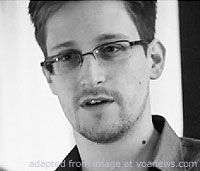Snowden Saga Fuels Difficult Questions

(Moscow Times – themoscowtimes.com – Ivan Nechepurenko – July 16, 2013) President Vladimir Putin said Monday that NSA leaker Edward Snowden would leave Russia “as soon as the opportunity arises” and that the U.S. had blocked any further movement for the fugitive, adding more intrigue to the ongoing whistleblower saga.
“The conditions for political asylum are clear to him, and judging by his latest statements he is changing his position [on leaking documents], but the situation still isn’t clear,” Putin said in comments carried by Interfax.
In response to a question about what would happen with Snowden next, Putin said, “How do I know? It’s his life, his fate,” before joking that Snowden was a “Christmas present.”
The president’s statement only fuels more questions in a situation that has observers wondering whether Snowden is truly capable of remaining independent in a foreign country where he does not know the language.
The Federal Migration Service said Monday that it had still not received Snowden’s application for asylum, leading to more speculation about what is going on behind the scenes.
Snowden, who remains stuck at Moscow’s main international airport while safely guarded by unidentified security officials, shed little light on who was helping him deal with everyday life at a meeting Friday with Russian officials and heads of international human rights organizations.
Evidently, the former U.S. government contractor had to rely on help from a third party in organizing that meeting, with the guest list showing an unlikely blend of international human rights organizations and a pro-Kremlin State Duma deputy, suggesting that someone must have given Snowden recommendations on who should be invited.
These and other concerns have led Andrei Soldatov, Russia’s preeminent expert on the security services, to question whether human rights activists the first to see one of world’s most sought-after fugitives in three weeks had fulfilled their duties in ensuring that Snowden was not being supervised by Russian security services.
“If human rights groups commit themselves to protect Mr. Snowden and be responsible for his fate, they have to make sure he is safe and in control of his own decisions,” he said.
Soldatov said that generally, when refugees arrive to Russia from Central Asian states, such as Tajikistan or Uzbekistan, the first thing human rights organizations do, if the refugees turn to them, is try to establish a clear picture of the person’s background.
“Both Amnesty International and Human Rights Watch are obviously concerned about their reputation, so they should be clear about who they are getting involved with,” he said.
But Alexei Nikitin, head of Amnesty International Russia, said that his organization had a limited scope in its work.
“What we are concerned about is human rights, and we repeatedly stated before the meeting that we consider Mr. Snowden a whistleblower and that he had the right to do what he did,” he said.
At the same time, Nikitin said it was clear that the meeting was under the control of the Russian government, noting that the way it was organized made him think that “Snowden’s asylum application will yield a positive result.”
Another participant at the meeting, Tanya Lokshina, a senior researcher at Moscow’s Human Rights Watch office, was more critical in her remarks.
“I did not understand what the meaning of the meeting was … It was very clear that the meeting was more like a news conference, albeit with no journalists present,” Lokshina told Interfax.
According to the head of the Federal Migration Service’s public council, Vladimir Volokh, Snowden’s application would take three to six months to process.
If Snowden is granted refugee status, he said, no limitations on his freedom of movement would be imposed.
“He will just have to register, like all Russian citizens do,” Volokh told Interfax.
Snowden’s choice of Guardian columnist Glenn Greenwald as a partner to preserve and propagate the secret files he obtained could have some questioning his sense of irony.
The Guardian’s relationship with the Russian government has been more than problematic in recent years, with Moscow correspondent Luke Harding expelled from the country in 2011 in what many saw as payback for his critical stance on Russia’s government.
Harding said in his 2011 book “The Mafia State” that he was harassed by the Federal Security Service, with security service members even breaking into his home in an intimidation campaign using psychological techniques developed by the KGB.
Peter Beaumont, foreign affairs editor at the Observer, the Guardian’s Sunday edition, also questioned Snowden’s real attitude toward Russia.
“Perhaps it was no more than being naive, but to list Putin’s Russia, as Snowden did, among his little list of countries for ‘being the first to stand against human rights violations’ suggests a dangerous moral relativism,” Beaumont wrote.
